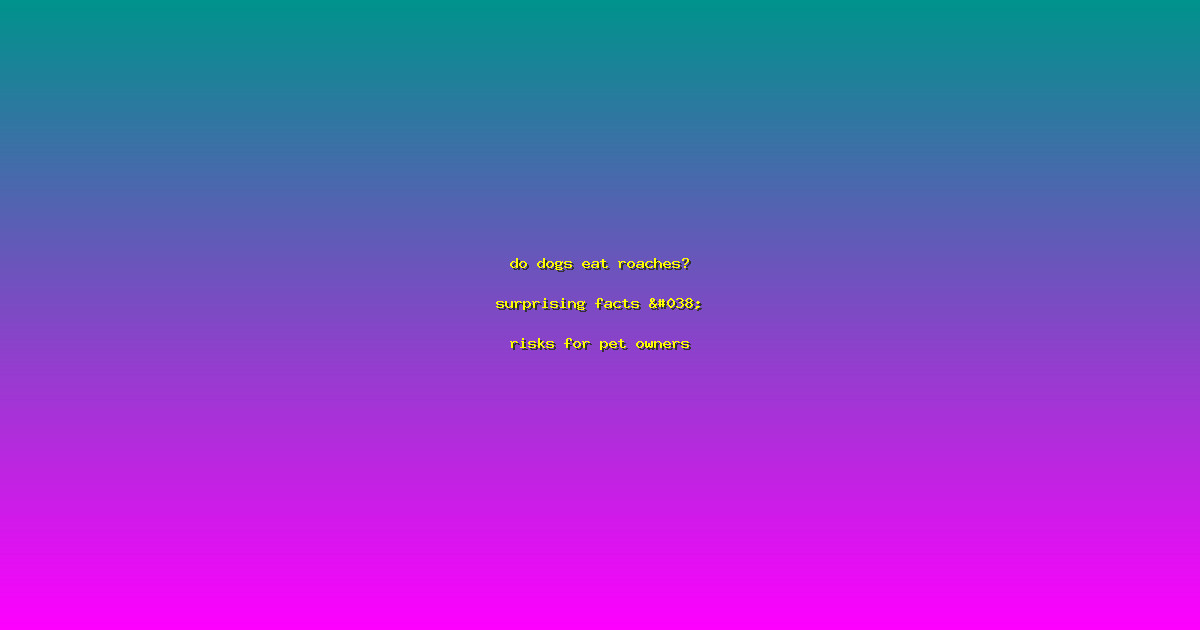do dogs eat roaches? surprising facts & risks for pet owners
Imagine coming home to find your dog happily munching on a roach. It’s a scene that might make your skin crawl, but it’s not as uncommon as you might think. Dogs, with their curious and sometimes indiscriminate appetites, often find themselves snacking on these creepy crawlies. But is it safe? In this article, we’ll explore the surprising facts and risks associated with dogs eating roaches, and provide tips to keep your furry friend healthy and happy. Let’s dive in and uncover the truth behind this unsettling behavior.
Why Do Dogs Eat Roaches?
Dogs are natural hunters and scavengers, and their instincts often lead them to explore and consume a variety of things. Roaches, with their high protein content and movement, can be particularly appealing to dogs. Here are some reasons why your dog might be eating roaches:
- Instinctual Behavior: Dogs have a natural hunting instinct, and the quick movements of roaches can trigger their predatory drive.
- Nutritional Value: Roaches are rich in protein and other nutrients, which can be attractive to dogs, especially if they’re not getting enough nutrition from their regular diet.
- Boredom: Dogs that are bored or under-stimulated may resort to eating insects out of curiosity or to alleviate their boredom.
Health Risks of Dogs Eating Roaches
While roaches might seem like an occasional snack, they can pose significant health risks to your dog. Here are some of the dangers associated with dogs eating roaches:
- Parasites: Roaches can carry parasites such as tapeworms and roundworms, which can infect your dog and cause serious health issues.
- Bacteria: Roaches are known to carry harmful bacteria like Salmonella and E. coli, which can lead to gastrointestinal problems and other illnesses.
- Poison: If roaches have been exposed to pesticides, your dog could ingest these toxins, leading to poisoning and severe health complications.
Preventing Your Dog from Eating Roaches
Preventing your dog from eating roaches is crucial to their health and well-being. Here are some practical steps you can take:
- Keep Your Home Clean: Regularly clean your home to reduce the presence of roaches. Seal any cracks or openings where roaches can enter.
- Supervise Your Dog: Keep an eye on your dog, especially when they’re outside or in areas where roaches might be present.
- Provide Plenty of Toys: Keep your dog entertained with toys and activities to reduce their boredom and curiosity about eating insects.
Frequently Asked Questions
Can eating roaches make my dog sick?
Yes, eating roaches can make your dog sick. Roaches can carry parasites, bacteria, and pesticides, all of which can cause serious health issues for your pet. If you suspect your dog has eaten a roach, monitor them for signs of illness and consult your veterinarian if necessary.
What should I do if I catch my dog eating a roach?
If you catch your dog eating a roach, try to remove the roach from their mouth if it’s safe to do so. Keep an eye on your dog for any signs of illness, such as vomiting, diarrhea, or lethargy. Contact your veterinarian for advice on how to proceed.
Are there any benefits to dogs eating roaches?
While roaches are high in protein, the risks far outweigh any potential benefits. The health risks associated with eating roaches, such as parasites and bacteria, make it a dangerous habit for your dog. It’s best to discourage this behavior and ensure your dog gets their nutrients from a balanced diet.
How can I keep roaches away from my dog?
To keep roaches away from your dog, maintain a clean home, seal any entry points, and use pet-safe pest control methods. Regularly clean food and water bowls, and store food in sealed containers to reduce the attraction of roaches.
What are the signs of roach poisoning in dogs?
Signs of roach poisoning in dogs can include vomiting, diarrhea, lethargy, tremors, and seizures. If you suspect your dog has ingested a roach that was exposed to pesticides, seek immediate veterinary care.
Conclusion
Understanding whether your dog eats roaches is crucial for their health and well-being. While it might seem like a minor issue, the risks associated with roach consumption can be severe. By taking preventive measures and being vigilant, you can protect your furry friend from the dangers of roach consumption. Remember, a clean home and a balanced diet are key to keeping your dog healthy and happy. If you suspect your dog has eaten a roach, don’t hesitate to consult your veterinarian for advice. Keep your dog safe and healthy by being aware of the risks and taking proactive steps to prevent this behavior.
